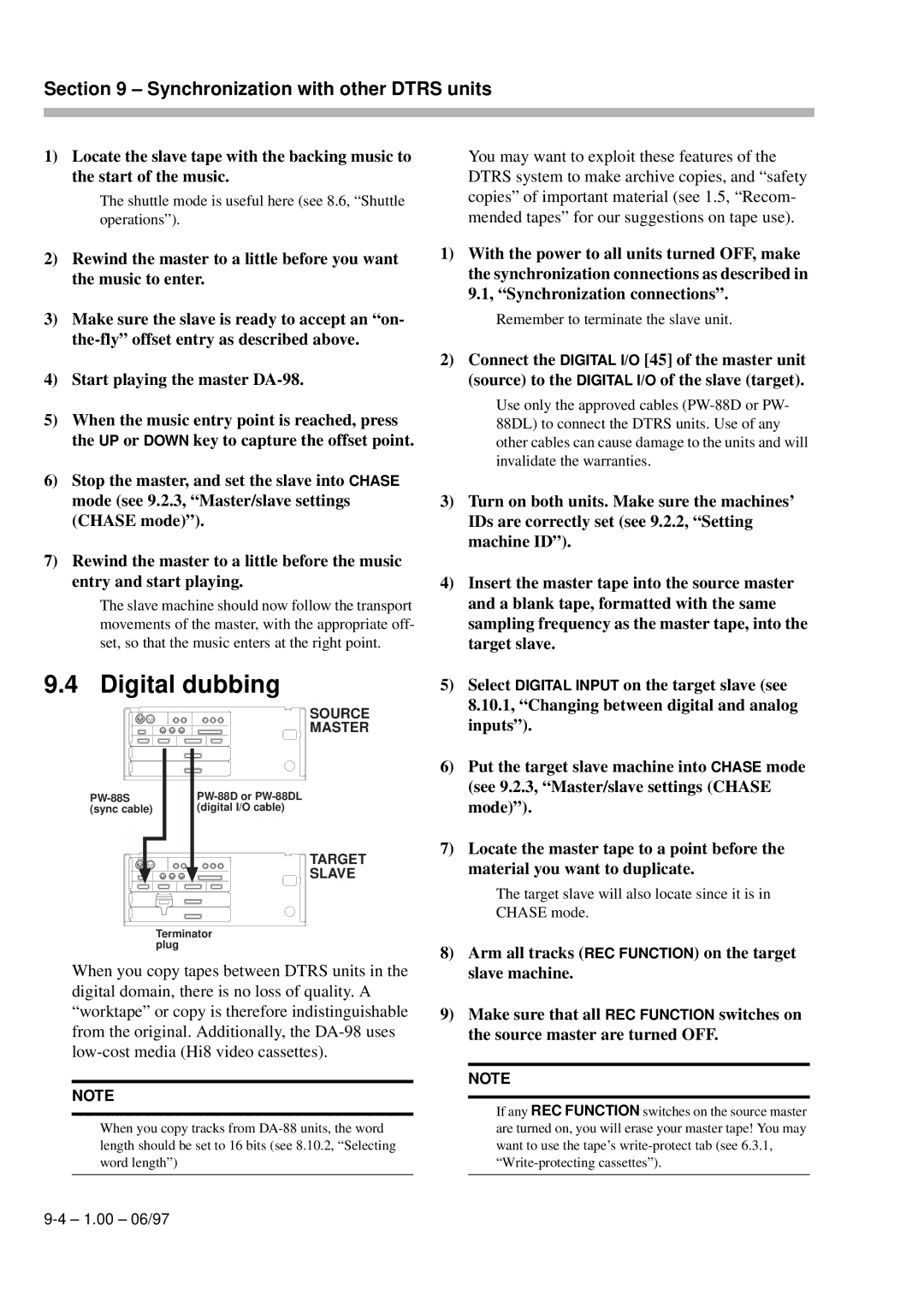DA-98
Important Safety Precautions
Important Safety Instructions
Table of Contents
Rear Panel connectors
Introduction to the DA-98
Front Panel controls
Advanced operations
Table of Contents Monitoring modes
Synchronization with other Dtrs units
Operations related to timecode
Example setups
Table of Contents Menu and parameter reference
Maintenance and memory setups
Options, specifications and reference
TOC-4 1.00 06/97
Unpacking
Features
Introduction to the DA-98
Precautions and recommendations
Using this manual
Clock source in a digital studio
Confidence replay
Environmental conditions
Installing the DA-98
Electrical considerations
Condensation
Tape brands
Recommended tapes
Available recording and playback time
Introduction to the DA-98
Front Panel controls
Auto Punch F 2 key Indicator
Rhsl F 1 key and indicator
Auto Play F 4 key and indicator
Digital in switch and indicator
Repeat F 9 key and indicator
Shtl MON F 8 key and indicator
LOC 2 Preset key
Shift key and indicator
REW key
Front Panel controls TC REC switch and indicator
FWD key
Stop key
Time Code in and OUT
Rear Panel connectors
40 RS-422
Meter Unit MU-8824
Rear Panel connectors
Synchronization connections
Connections
Audio connections
Midi connectors in , OUT and Thru
1 RS-422 connector
Control connections
Word clock connections
Parallel control
Connection to other Tascam units
Multiple Dtrs units
Indirect word sync
Connections
Menus
Menu operations
FunctionFunctionkey modes
Resetting a menu value
Changing menu values fast
Blanking the screen display
Shift key and function keys
To assign a menu screen to a key
Assigning menus to function keys
Recalling an assigned menu function
PressLothecaFt5e0key1Pm13rien-0r5oslelc
Formatting a tape
Basic operations
Aborting the format process
Threaded, the tape counters will show
Preparing to record
Recording the first tracks
Recording while formatting
Write-protecting cassettes
Track bouncing
Overdubbing
Punch-in and punch-out
Replaying the first tracks
Setting punch points on the fly
Automatic punch point setting
At the point where the punch is to occur, press
At the point where you want to punch out, press Play
Press Escape to re urn to menu group
Setting punch points using the menus
Basic operations Editing the pre-roll and post-roll times
Recording the punch-in
Rehearsing the punch-in
Interrupting a rehearsal or punch recording
Press the Auto MON key so that the indicator goes out
Exiting punch-in mode
Replaying the punched material
To replay the punch-in, press the Play key
Basic operations
Monitoring controls
Monitoring modes
ALL Input 18 and Input Monitor
Auto MON
Monitoring modes Shuttle monitoring
Confidence mode
To leave confidence mode, press
Using confidence mode
Arming tracks in pairs
Monitoring modes
Setting the location pre-roll time
Setting Memo 1 and Memo 2 on the fly
Advanced operations Autolocation
Checking, editing and manually entering Memo 1 and Memo
Moving to Memo 1 and Memo
Press the LOC 2/PRESET key
Editing function key memories
Pr ss Enter
Repeat function
Locating to a function key memory
To start repeat play
Location and playback
Press the Enter key
Track delay
Crossfade times
Vari speed pitch control
Use the UP and Down keys to adjust the crossfade time
Shuttle operations
Press Enter
Shuttle muting
Reference levels
LevelEnter m nu
Use the UP and Down keys to select between
Meter modes
Keys to set the value for the peak signal level hold time
Sine oscillator
Advanc d operations Meter ballistics
Routing digital inputs
Digital recording
Changing between digital and analog inputs
Selecting word length
Dither
REC Mute recording silence
Lecting dither settings
Setting the power-on message
Differences between Dtrs models
Machine ID and master/ slave settings
Synchronization with other Dtrs units
Machine offset
Setting mac ne ID
Offset +00
Ing machine offset
An example of setting offsets
Cancelling machine offset
Setting machine On the fly
Start playing the master DA-98
Digital dubbing
On the master machine, hold down Record and press Play
Synchronized formatting
Synchronization with other Dtrs units
ABS and SMPTE/EBU timecode
Operations related to timecode
ABS time
Tape timecode
Location point settings
Tape timecode mode
TcTrack setting
ABS setting
Checking tapeTCTrack
ABS-13 and ABS-23 settings
Timecode input and output
Selecting the frame rate
Pull up and pull down Fs shift
Timecode input
Timecode output timing
Timecode output
Timecode output format
Recording timecode using the generator
Using Midi Time Code MTC
Recording timecode
Selecting the timecode source
10.1.3, Sele ting TC or ABS timing
Press the TC REC switch
Select a frame rate see 10.3, Selecting
Frame rate
Assembling timecode
Menu see 10.2.1, TcTrack setting
External timecode sources
Start playing the tape
When recording timecode from another Dtrs
When recording timecode from a timecode
When recording timecode from a digital source
When recording timecode from an analog
Chasing to timecode
Video resolution
Checking external timecode
Machine ID and timecode
SectionOffset10 Operations related to timecode
Setting timecode offset
Cancelling timecode offset
Park position
Automatic park position setting
Absolute and relative difference
Play the timecode master
Rechasing timecode
10.7.10Bypassing timecode errors
10-14 1.00 06/97
External control
Record delay
Use with 9-pin external control
Pro oc
Still
Cue-up tally
Fast wind speed
Tr k mapping and press Enter
Track mapping
Timecode track mapping
Midi Machine Control
Bus protocol
Midi
11-6 1.00 06/97
Menu group
Menu and parameter reference Menu groups
Ference
Menu and parameter
ErrBypass
Menu and parameter Refe ence
OutTcSrcTapeTC
Section
TrkMapCueupTly
12.1.10Menu group
Stop
12.1.12Menu group F
12.1.11Menu group E
Menu item ind
ArkPsition
An all-DA-98 setup
Example setups
Post-production work
Example setups
Project studio ‘B’ room
Example setups
13-6 1.00 05/30/97
To c ean he heads and transport
Maintenance and memory setups Head and transport cleaning
Checking head time
Checking error rates
Saving user setups
User setups
Checking version
Resetting the memory
Software upgrades
15.1.1 RM-98 Rack Mount Adaptor
Options, specifications and reference Options for the DA-98
Remote control RC-848
Cables
Control I/O connector pinout
Digital audio convertors
Physical specifications
Specifications
Power specifications
Digital recording characteristics
15.2.8 9-pin RS-422, MIDI, synchronizer specifications
Options, specifications and reference Tape transport
Audio specifications Inputs and outputs
Options, specifications and reference
SYS. MAS
MMC Bit Map Array
15-7 1.00 06/97
Midi
Midi Implementation Chart
BER
Index
Index-10 1.00 06/97
06/97 1.00 Index-11
Index-12 1.00 06/97
DA-98

